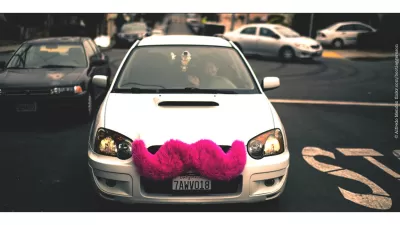Money, not trust, is the driving force behind the willingness of so many people to open their doors to the sharing economy, according to one writer.
Kevin Roose has penned a response to an earlier article by Jason Tanz in Wired about how the sharing economy encourages trust between strangers. "Tanz's thesis isn't wrong — these innovations have certainly made a difference. But it leaves out an important part of the story. Namely, the sharing economy has succeeded in large part because the real economy has been struggling," writes Roose.
"A huge precondition for the sharing economy has been a depressed labor market, in which lots of people are trying to fill holes in their income by monetizing their stuff and their labor in creative ways. In many cases, people join the sharing economy because they've recently lost a full-time job and are piecing together income from several part-time gigs to replace it."
Roose includes a number of charts documenting the depressed state of the job market, as well as some links to other writers' thoughts on the benefits of the shared economy to its users (on either side of the exchanges facilitated by the software of companies like Uber and Airbnb).
FULL STORY: The Sharing Economy Isn’t About Trust, It’s About Desperation

Maui's Vacation Rental Debate Turns Ugly
Verbal attacks, misinformation campaigns and fistfights plague a high-stakes debate to convert thousands of vacation rentals into long-term housing.

Planetizen Federal Action Tracker
A weekly monitor of how Trump’s orders and actions are impacting planners and planning in America.

San Francisco Suspends Traffic Calming Amidst Record Deaths
Citing “a challenging fiscal landscape,” the city will cease the program on the heels of 42 traffic deaths, including 24 pedestrians.

Defunct Pittsburgh Power Plant to Become Residential Tower
A decommissioned steam heat plant will be redeveloped into almost 100 affordable housing units.

Trump Prompts Restructuring of Transportation Research Board in “Unprecedented Overreach”
The TRB has eliminated more than half of its committees including those focused on climate, equity, and cities.

Amtrak Rolls Out New Orleans to Alabama “Mardi Gras” Train
The new service will operate morning and evening departures between Mobile and New Orleans.
Urban Design for Planners 1: Software Tools
This six-course series explores essential urban design concepts using open source software and equips planners with the tools they need to participate fully in the urban design process.
Planning for Universal Design
Learn the tools for implementing Universal Design in planning regulations.
Heyer Gruel & Associates PA
JM Goldson LLC
Custer County Colorado
City of Camden Redevelopment Agency
City of Astoria
Transportation Research & Education Center (TREC) at Portland State University
Jefferson Parish Government
Camden Redevelopment Agency
City of Claremont




























